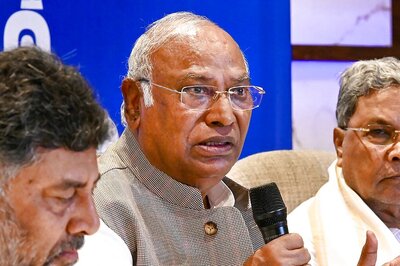
views
New Delhi: The West Bengal government on Friday told the Supreme Court that the row over the recently concluded panchayat polls in the state has led to a "constitutional crisis" since the tenure of several Panchayats were over and new bodies have not been made functional.
The apex court had earlier stayed the Calcutta High Court order asking the state election body to accept the nomination papers filed through e-mail for panchayat elections and directed the poll panel not to declare in the gazette the names of those candidates who had won unopposed.
A bench of Chief Justice Dipak Misra and Justice D Y Chandrachud was told that a constitutional crisis has emerged as tenure under Article 243(E) (duration of Panchayat) of the Constitution of several panchayats is over.
"The funds allotted to panchayats will go back. There is a constitutional crisis under Article 243(E) of the Constitution. The development in the villages has come to a standstill," the counsel for the state government said.
The top court, said that it is a part heard matter by a three-judge bench and only when the bench is in appropriate combination, it will be taken up for hearing.
It listed the matter for further hearing on August 20.
The top court had on August 13 asked the West Bengal State Election Commission (WBSEC) as to whether it conducted any probe into the fact that a large number of seats in the local body elections in the state went uncontested.
Out of a total 58,692 posts for gram panchayat village, zilla parishad and panchayat samiti, 20,159 had remained uncontested in the violence-marred local polls in the state held in May this year.
It had said the state poll panel that the issue of huge number of uncontested seats has been bothering it.
The poll panel had argued that 33 per cent of nearly 50,000 panchayat seats going uncontested in the state was not "an alarming situation".
It had cited Uttar Pradesh where almost 57 per cent panchayat seats went uncontested and the figure was 51, 67 and 27.6 per cent in Haryana, Sikkim and Andhra Pradesh respectively.
The panel had said that it cannot persuade political parties to field candidates and, moreover, it took prompt actions when it received complaints about panchayat elections and even held re-polls.
The West Bengal government had said that the panchayat polls cannot be set aside on the basis of "conjecture and surmises" of some political parties as no individual candidate has approached the court with the claim that he or she has been restrained from filing nomination papers.
The ruling All India Trinamool Congress party had contended that not a single candidate has approached any court with the grievance that he or she has been stopped from filing nomination papers.
The opposition parties CPI(M) and BJP, who have opposed the contention of the state government, poll panel and the TMC, alleged that West Bengal did not witness a free and fair election and the candidates hailing from these two parties were stopped from filing nomination papers.
During the previous hearings, the apex court had expressed shock at the fact that "thousands and thousands" of seats in the recent West Bengal panchayat polls had remained uncontested, observing that these figures showed that grass root-level democracy was not working.
It had directed the state election commission to provide exact statistics about such contested posts by tomorrow.
Elections were held in phases for 48,650 posts in Gram Panchayats, 825 posts in Zilla Parishads and 9,217 posts in Panchayat Samitis and it has been alleged that around 34 per cent seats were uncontested.
The apex court had earlier refused to stay the poll process observing that there were a plethora of judgements which have held that once the poll process has begun, it cannot be interfered into by any court.
The court was hearing an appeal filed by the state election panel against the High Court order asking it to accept the nomination papers filed through e-mail for the panchayat elections.
The CPI(M) had claimed that many of its candidates were prevented from filing nominations by the state's ruling Trinamool Congress.

















Comments
0 comment